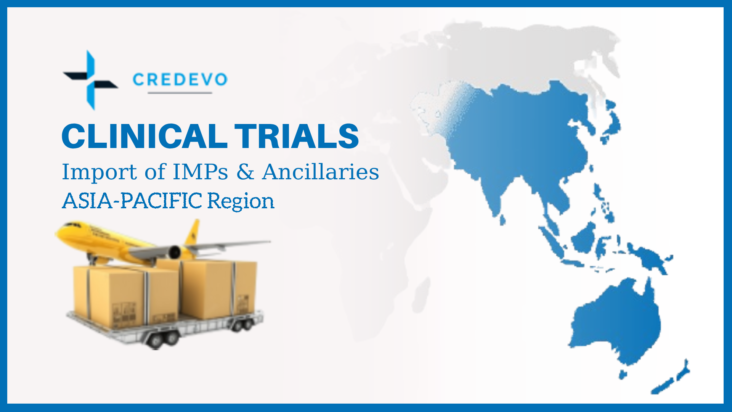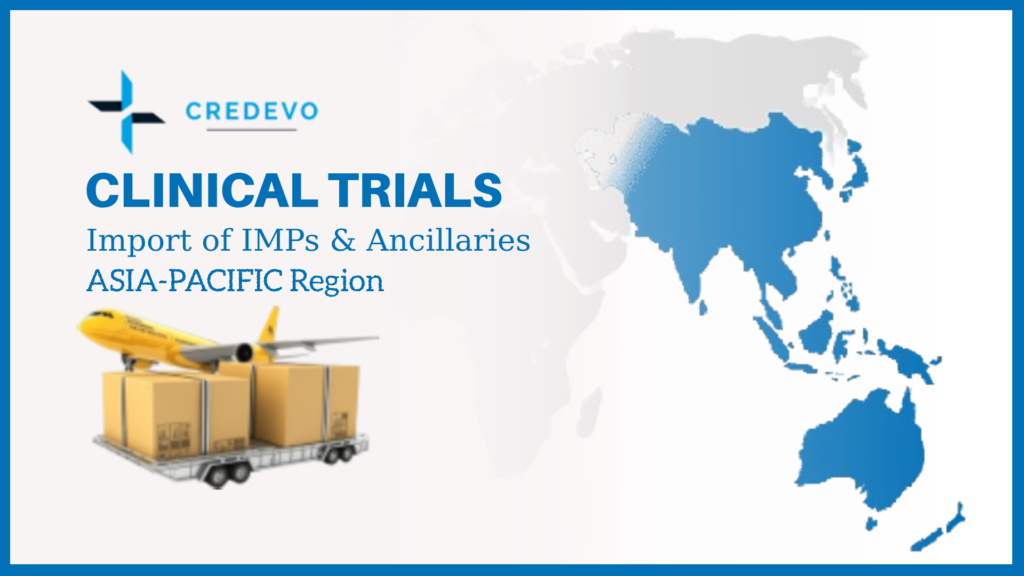Importing Ancillaries & IMPs For Clinical Trials In The Asia-Pacific Region

Importing Ancillaries and IMPs for clinical trials in the Asia-Pacific region presents numerous challenges. Navigating diverse regulatory landscapes, and logistical complexities, ensuring quality control, and managing timeliness and costs are critical hurdles.

Effective risk mitigation strategies are essential for overcoming potential disruptions. Overall, addressing these challenges is vital for the successful execution of clinical trials in this dynamic region. IOR services contribute significantly to the growth and success of registering medical products in foreign countries by handling the intricacies of import processes, ensuring compliance, and promoting smoother cross-border transactions.
Top 7 challenges in importing Ancillaries & IMPs for clinical trials in the Asia-Pacific region
Importing Ancillaries and IMPs (Investigational Medicinal Products) for clinical trials in the Asia-Pacific region poses several challenges.
- Regulatory complexities, diverse cultural practices, and varying importation procedures across countries are difficult to handle.
- Language barriers, differences in documentation requirements, and evolving regulations further contribute to the difficulty.
Importers must navigate these challenges adeptly, employing local expertise, ensuring compliance with regulations, and fostering effective communication to streamline the importation of essential clinical trial components.
Here are some of the challenges that importers face.
- Diverse regulatory landscapes: Different countries in Asia-Pacific have distinct regulatory frameworks for clinical trials. Understanding these diverse regulations is crucial for successful importation.
- Varied importation processes: Each country may have specific procedures and paperwork for importing Ancillaries and IMPs. Adapting to these varied processes ensures compliance and avoids delays in the importation timeline.
- Language barriers: Dealing with documentation and communication in multiple languages can be challenging. Accurate translation of documents is essential to prevent misunderstandings and facilitate smooth communication.
- Ensuring compliance with local standards: Meeting local quality and safety standards is vital for regulatory approval. Regular audits and adherence to specific guidelines help ensure the products align with local requirements.
- Customs procedures variations: Customs procedures differ between countries, affecting the clearance process. Staying informed about each country’s customs requirements minimizes delays and potential issues.
- Need for experienced local partners: Collaborating with local experts familiar with regional regulations is invaluable. Local partners provide insights and facilitate smoother importation processes.
- Regular monitoring of regulatory updates: Regulations in the Asia-Pacific region can evolve; staying updated is crucial. Regular monitoring of regulatory changes helps in adapting importation strategies accordingly.
How to overcome challenges in importing Ancillaries & IMPs for clinical trials in the Asia-Pacific region
Overcoming challenges in importing ancillaries and IMPs for clinical trials in the Asia-Pacific region involves thorough planning and collaboration. Simplify the process by establishing clear communication with local authorities, understanding regulatory requirements, and building strong partnerships with reliable suppliers.
This proactive approach will enhance efficiency, reduce hurdles, and contribute to the success of clinical trials in the dynamic Asia-Pacific landscape.
Let’s discuss how to overcome those challenges.
- Understanding diverse regulations
- Get the help of local regulatory experts to navigate country-specific requirements.
- Addressing language barriers
- Use professional translation services or foster clear communication to prevent misunderstandings.
- Compliance with local standards
- Conduct regular audits to ensure adherence to varying standards.
- Collaborate with local authorities to stay aligned with quality expectations.
- Managing customs procedures
- Maintain up-to-date knowledge of customs requirements in each country.
- Ensuring product quality
- Implement robust quality control measures throughout the supply chain.
- Utilize temperature-controlled transportation for sensitive products.
- Monitoring regulatory updates
- Update the teams on evolving regulations and their implications regularly.
Import regulations in the Asia-Pacific region
Medical product import regulations in the Asia-Pacific region demand an understanding of diverse requirements across countries. With unique rules in Asia Pacific region countries, compliance is crucial. Clear communication with local authorities helps address issues promptly, and staying informed about regulatory updates is necessary.
| Key Countries | Import regulations in each country | The Role of Importer of Record (IOR) |
|---|---|---|
| China | China’s import regulations for medical products are overseen by the China Food and Drug Administration (CFDA), now part of the National Medical Products Administration (NMPA). Importers must register with the NMPA. | Registering with the National Medical Products Administration (NMPA).Ensuring compliance with the medical device supervision and management regulations.Obtaining necessary approvals or certifications for specific medical devices.Adhering to Good Manufacturing Practice (GMP) standards.Coordinating customs clearance, and paying applicable duties and taxes based on declared values. |
| Singapore | In Singapore, the Health Sciences Authority (HSA) regulates medical products. Importers must obtain product registration from the HSA before importing. | Registering with the Health Sciences Authority (HSA).Obtaining product registration from the HSA.Ensuring compliance with the Health Products Act.Acquiring necessary permits for importing controlled drugs or specific medical devices.Managing accurate documentation for customs clearance.Adhering to quality standards set by the HSA.Addressing Goods and Services Tax (GST) implications. |
| Malaysia | Medical Device Authority (MDA) manages medical product import regulations in Malaysia. Importers must register with the MDA. | Registering with the Medical Device Authority (MDA).Obtaining product registration from the MDA.Ensuring compliance with the Medical Device Act.Adhering to Good Distribution Practice (GDP) standards.Managing accurate documentation, including product registration and import permits. |
| South Korea | South Korea’s medical product import regulations fall under the oversight of the Ministry of Food and Drug Safety (MFDS). Importers must register with the MFDS. | Registering with the Ministry of Food and Drug Safety (MFDS).Obtaining approval or certification for some medical devices from the MFDS.Ensuring compliance with the Pharmaceutical Affairs Act.Managing accurate documentation, including product registration and testing reports. |
| India | Central Drugs Standard Control Organization (CDSCO) manages the medical product import in India. Importers must obtain a registration certificate. Compliance with the Drugs and Cosmetics Act is essential. | Registering with the Central Drugs Standard Control Organization (CDSCO).Obtaining a registration certificate and necessary approvals for medical devices.Ensuring compliance with the Drugs and Cosmetics Act.Managing accurate documentation, including product registration and testing reports. |
| Australia | Therapeutic Goods Administration (TGA) oversees medical product import regulations in Australia. Importers must register with the TGA. | Registering with the Therapeutic Goods Administration (TGA).Obtaining registration on the Australian Register of Therapeutic Goods (ARTG) for some medical devices.Ensuring compliance with the Therapeutic Goods Act.Adhering to Good Manufacturing Practice (GMP) standards.Managing accurate documentation, including product registration. |
| Thailand | The Thai Food and Drug Administration (Thai FDA) manages medical product import regulations in Thailand. Importers must register with the Thai FDA. | Registering with the Thai Food and Drug Administration (Thai FDA).Obtaining approval or certification for some medical devices from the Thai FDA.Ensuring compliance with the Medical Device Act.Managing accurate documentation, including product registration and testing reports. |
| Japan | The Pharmaceuticals and Medical Devices Agency (PMDA) oversees the medical product regulation in Japan. Importers must obtain marketing approval from the PMDA. | Registering with the Pharmaceuticals and Medical Devices Agency (PMDA).Obtaining marketing approval from the PMDA for some medical devices.Ensuring compliance with the Pharmaceutical and Medical Device Act.Managing accurate documentation, including product registration and testing reports. |
If you need more details on IOR services for clinical trials in Japan, please follow the link below.
How IOR services streamline the import process
Importer of Record (IOR) services streamline the import process by taking on legal responsibility for imported goods. They navigate complex regulations, manage documentation, and ensure compliance, easing the burden.
- IORs bring in-depth knowledge of local regulations, ensuring compliance
- They handle necessary permits, licenses, and customs documentation
- IORs handle paying customs duties and tariffs on behalf of the importer
- By managing compliance, IORs reduce the risk of delays or legal issues
- Building relationships with local authorities aids in navigating regulatory complexities effectively
Choosing the right Importer of Record (IOR)
Choosing the right Importer of Record (IOR) service provider is crucial for a seamless import process. Start by assessing their experience and expertise in the countries you operate in within the Asia-Pacific region.
- Ensure the IOR has a robust understanding of local customs procedures, tariffs, and industry-specific regulations
- It’s beneficial if they have established relationships with local authorities, fostering smoother interactions
- Choose an IOR service provider that aligns with your requirements, offers transparent communication, and has a proven record of facilitating successfully
Factors to consider when selecting an IOR
- Assess the experience of handling import processes in the Asia-Pacific region
- Ensure they have expertise in the specific regulations of the countries involved
- Check if they have successfully managed the necessary permits, licenses, and documentation
- Evaluate the understanding of local customs procedures, tariffs, and industry-specific regulations
- Consider established relationships with local authorities to facilitate smoother interactions
Risk management and compliance in importing
Effective risk management and compliance are essential in importing medical products. Importers must identify potential risks and establish strategies to mitigate them.
Compliance with import regulations ensures that products meet the necessary standards and legal requirements, preventing delays, fines, or other complications.
Additionally, thorough risk management involves assessing factors like geopolitical issues, supply chain disruptions, and fluctuations in currency exchange rates.
The following points will enhance your knowledge regarding proper risk management.
- Regulatory compliance: Stay informed and comply with the diverse import regulations of each country.
- Thorough due diligence: Conduct comprehensive research on suppliers, considering their reliability and compliance history.
- Risk assessment: Identify potential risks, including geopolitical issues, supply chain disruptions, and currency fluctuations.
- Transparent communication: Maintain clear and open communication with all stakeholders in the supply chain.
- Monitoring regulatory changes: Stay vigilant about changes in import regulations and adjust strategies accordingly.
- Documentation accuracy: Ensure all import documentation, including permits and licenses, is accurate and up-to-date.
Conclusion
Importer of Record (IOR) services are helpful in the complex medical products import landscape in the Asia Pacific Region. Acting as a reliable partner, IORs ensure compliance with diverse regulations, easing the burden on importers seeking to import goods for clinical trials and research purposes. Their expertise in local customs procedures, documentation management, and adherence to industry-specific standards fosters a smooth and lawful importation process.
In a region with varying import regulations, the role of an IOR becomes instrumental in facilitating successful and efficient cross-border trade, contributing to the growth and sustainability of importers engaging in medical products import in the Asia-Pacific.
Do you have any questions about importing IMPs or ancillaries for your clinical trials?
Do you have any questions regarding importing IMPs or ancillaries for your clinical trials in the Asia-Pacific regions, or do you need our support for conducting your clinical trials in this area? Please provide your requirements details below to connect with our expert team.